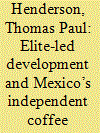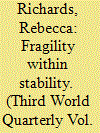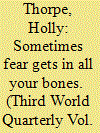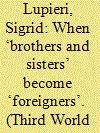|
|
|
Sort Order |
|
|
|
Items / Page
|
|
|
|
|
|
|
| Srl | Item |
| 1 |
ID:
171929


|
|
|
|
|
| Summary/Abstract |
In this article, we aim at sharpening common understandings of the notion of political crisis to better explain the trajectories of authoritarian transformations during popular uprisings. We make three major claims. First, we propose a definition of crisis as brief moments of institutional fluidity and openness in which a process can take different directions. We delineate the crisis concept from the concept of critical junctures and outline how our approach contributes to the methodological debate on ‘near misses’. Second, we indicate how the de-institutionalisation processes leading up to a crisis are to be analytically distinguished from within-crisis moments. We argue in favour of a discontinuity approach that takes into account the different temporalities of gradual lead-up processes and rapid within-crisis dynamics. Finally, we illustrate our theoretical and analytical reasoning with concrete cases from the authoritarian crises of the Arab uprisings, whilst suggesting that our argument can travel to other areas of research in which crisis narratives have gained prominence.
|
|
|
|
|
|
|
|
|
|
|
|
|
|
|
|
| 2 |
ID:
171928


|
|
|
|
|
| Summary/Abstract |
Between 2012 and 2016 a virulent strain of coffee rust reduced Mexican yields by more than 50%, and it is still devastating production. The government has responded by replacing traditional arabica plants vulnerable to the pathogen with resistant, high-yielding varieties to recover the sector and encourage long-term adaptation to a disease that cannot be eradicated. However, this contribution will attempt to show that the intractable nature of the epidemic and the biological characteristics of resistant varieties threaten the survival of independent coffee organisations and their agroecological shade coffee systems. With little or no possibility of recovering production without the use of resistant plants, the alternative production and marketing models that these organisations have constructed over the past three decades face unprecedented challenges.
|
|
|
|
|
|
|
|
|
|
|
|
|
|
|
|
| 3 |
ID:
171931


|
|
|
|
|
| Summary/Abstract |
Even in the context of a relatively flourishing state, fragility can be an enduring feature of a political system, particularly in the case of recently established or unrecognised states. This article examines the nature of state-building in a specific context to question the assumption that forms of hybrid governance or pre-existing forms of governance are a necessary evil to be tolerated but which needs ultimately to be overcome during state-building. It does this by adopting the language of resilience and focusing on the case of Somaliland to highlight the role of clan governance as a mechanism of political resilience and as a means of promoting the flexibility required for state-building. Yet, at the same time, the process of state-building often involves formalising governance and limiting the role of traditional social-political forms of governance such as clans, ignoring their role in legitimating and stabilising the political system. However, as this article argues, stability and fragility are inextricably linked; while the clan system has been an important force in stabilising the state, it has also become a pressure point for the state’s latent fragility. By contextualising fragility and stability within the language of resilience, though, this symbiotic relationship can be better analysed.
|
|
|
|
|
|
|
|
|
|
|
|
|
|
|
|
| 4 |
ID:
171930


|
|
|
|
|
| Summary/Abstract |
Iran and Turkey have competed for regional power projection in Syria and sought through cooperation to find a peaceful end to the conflict in the Astana talks, while also at the same time confronting each other in Idlib province via proxies. This simultaneity of competition, cooperation and confrontation in the Syrian Crisis presents a picture of a relationship that is riddled with contradictions and is in effect a paradox. The question that must be asked is, how can we understand this puzzle of competition, cooperation and confrontation in Turkish–Iranian relations in the Syrian Crisis? International historical sociology (IHS) research brings in discussions on the longue durée, narratives, domestic constraints and, most important, the international which can help decipher this intellectual puzzle. Moreover, the ‘relationality’ of each country’s policies in Syria combined with IHS can help unlock the puzzle of the Turkish–Iranian relationship in the Syrian Crisis and provide insight into the debate surrounding the outbreak of war.
|
|
|
|
|
|
|
|
|
|
|
|
|
|
|
|
| 5 |
ID:
171926


|
|
|
|
|
| Summary/Abstract |
This article examines the political economy of national ownership, focusing on the reconstruction of the healthcare system in post-conflict Timor-Leste in relation to the shift from aid dependence to oil dependence. Considering three main approaches to development policymaking, it argues that, from 2002, the government generally used patronage-based strategies that benefitted elite political networks, increasing corruption. Based on empirical research, the study demonstrates that, in several areas, the government of the Revolutionary Front for an Independent East Timor (2002–2007) could exercise some autonomous decision-making despite being heavily aid dependent. Later, under the National Congress for Timorese Reconstruction government (2007–2017), empowered by oil resources, elites had greater control over development. However, the creation of a ‘modern’ healthcare system was central to the elites’ political ideology, involving populist rather than patronage-based politics. Analysis of this research indicates that ownership regarding healthcare has become concentrated among powerful groups, while health professionals, who advocate a neoliberal approach, lack a political voice. Thus, the paper problematises the Paris Declaration’s focus on country ownership to ensure better aid delivery as unrealistic because ‘ownership’ becomes subject to contestation.
|
|
|
|
|
|
|
|
|
|
|
|
|
|
|
|
| 6 |
ID:
171927


|
|
|
|
|
| Summary/Abstract |
Official figures claim that almost 3000 people were killed, and many more injured or displaced, in four days of rioting aimed at the Sikh population of Delhi in late October and early November 1984 following the assassination of Indira Gandhi. This article analyses the efforts made to address the human rights violations that occurred. It argues that as a divided democracy, India has struggled to do justice to the victims, despite multiple commissions of inquiry, compensation schemes and a prime ministerial apology. It argues that this has occurred not simply because of challenges commonly faced by democracies dealing with similar incidents, but also because of the particular problems faced in a context in which we see continuity of rule by a political elite allegedly implicated in the abuse and in which there is acute concern for the survival of a fragile divided polity.
|
|
|
|
|
|
|
|
|
|
|
|
|
|
|
|
| 7 |
ID:
171924


|
|
|
|
|
| Summary/Abstract |
In the context of increasing risk for aid workers, a growing body of scholarship is focused on risk management in contexts of humanitarian assistance and development work. Much less attention, however, has been given to how staff and volunteers experience such risks. This paper adopts a feminist geographical approach to explore how development workers make meaning of risk in specific contexts. Adopting a qualitative approach, it draws upon 14 semi-structured in-depth interviews with international (7) and local (7) staff of an international educational and sporting non-governmental organisation (NGO) in Afghanistan. After exploring differences between local and foreign staff perceptions of risk, it also offers a gendered analysis of risk for women development workers in Afghanistan. In so doing, this paper contributes to the growing body of literature in ‘Aidland’ studies by revealing the complex understandings of risk and fear by both foreign and local staff in the same geographical and organisational context. For NGOs seeking to make life-saving decisions based on the calculation of risk, this paper evidences the need to also create space for the voices of local and foreign staff whose experiences of risk will be highly relational, embodied, gendered and context specific.
|
|
|
|
|
|
|
|
|
|
|
|
|
|
|
|
| 8 |
ID:
171925


|
|
|
|
|
| Summary/Abstract |
Does overseas development aid necessarily translate into more generous national policies for refugees? Evidence from Jordan suggests that this is not always the case. Since the arrival of an estimated 756,000 Syrian refugees, international funding has made Jordan one of the top seven recipients of foreign aid in the world. Despite sustained international financing, however, national policies towards refugees have become increasingly restrictive, especially when it comes to healthcare. Based on fieldwork conducted between 2017 and 2019, this paper argues that Jordan’s healthcare policies towards Syrian refugees are not necessarily correlated to international financing, but are rather the product of political considerations aimed at maintaining domestic stability, increasing bargaining power in the global policymaking arena and resisting international pressures to integrate Syrian refugees. This paper contributes to filling a gap in the literature on the complex and interdependent factors which influence the evolution of national healthcare policies towards refugees in a country not only highly dependent on foreign aid, but also at the geopolitical crossroads of international interests in the Middle East.
|
|
|
|
|
|
|
|
|
|
|
|
|
|
|
|
|
|
|
|
|